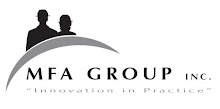That was a question I was asked to comment on at a recent Partner Retreat.
The firm in question was reviewing it's own IT and software issues and decided to ask me, from what I have seen in recent years at firms I have consulted with, how this firm stood as far as it's 'up-to-date-ness' and what an investment of $x should be expected to yield in new revenues or cost savings.
'Well' I said 'It all depends on your point of view and what you want to achieve' I then went on to ask them about their objectives, their budget, the type of services involved and so on until I had a clear view of what they were really asking me.It turns out, they were struggling with two things, and each one hit home to me just how much software has changed what we do and how we do it, and what a competitive advantage there is to be had for those with vision.
First of all, the client was asking me about auto-flow. Had I seen it working? Was it as good as it sounded? How accurate was it? and so on - the questions were flying!
Could a tax return really be completed, accurately, without having to input a single number?
So, I sat them down and told them the truth... the best system I had seen was about 85% accurate, so we're not yet at the stage where we can train monkeys to do this - but we are getting there!
There will always be a certain level of human input in the preparation or review of tax returns, but autoflow is taking us a giant leap away from the number of hours previously required to complete a tax return.
So, if you are prepared to accept that 15% of your returns need adjustments, autoflow is the way to go. The alternative is to enter 100% of the data into all client tax returns. Which would you rather have?
Based on this, they agreed that an 85% time saving, less the time involved in scanning, could be a substantial saving for them. They took a conservative view, and agreed that the receptionist and other administrative staff could easily be trained on how to scan T-Slips and so on, and after taking the time costs of staff, the assessed a 65% to 70% time saving (in real dollars) could be achieved.
Using that, they decided to move forward with that investment as a priority. It really was a no-brainer.
But more was yet to come.
Next, they wanted to know more about a 'what-if' analysis tool they had read about in my column for 'The Bottom Line' and seen demonstrated on a roadshow.
This tool took the client's data and allowed the practitioner to perform all manner of 'what-if' type scenario setting. You could set a target of $500,000 additional profit, and the software will work out for you how many extra units the client needs to sell, or by how much to increase prices to get to the goal, and many other options - like what costs would have to be cut - and so on.
Then it's down to the practitioner, using their knowledge of the client and their professional skill and judgment, to offer comments and modifications to the software suggested options and to make a blend of small adjustments here and there to arrive at the required outcome.
Now, the practitioner can sit down and say something like, 'well, if you can increase your prices by 1.3%, reduce costs by 0.75%, and increase volume by 2.1%, the effect of these combined criteria will produce an additional $499,876 in profit next year.'
In my previous life as a practitioner myself, I would have spent hours and hours on excel spreadsheets trying to fathom out these answers, but with the tools available today, they can be calculated in a nano-second!
Boy, how things have changed.
For the forward-thinking practitioner these two tools can make a tremendous difference to the type of work they do, the revenues they can generate and the satisfaction they can deliver to their clients.
Just imagine if every client had the ability to see the financial impact of any business decision BEFORE they actually made that decision?
Don't you think you'd have better clients a s a result? And what impact would that have on your own professional and financial satisfaction?
So yes, I answered, I do believe that being Hi-Tech offers a real opportunity to differentiate the firm, make more money and enjoy your work a little more than you did before, and it's definately not a smoke and mirrors job!
Subscribe to:
Post Comments (Atom)



No comments:
Post a Comment